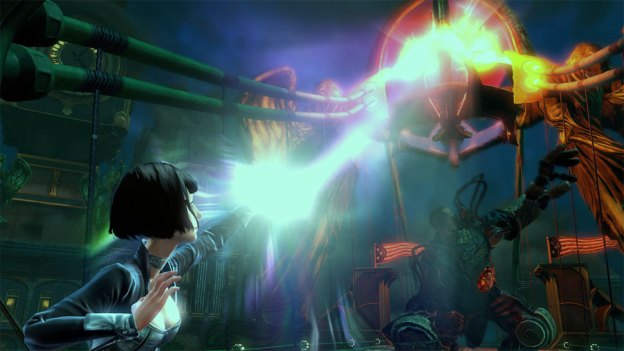
A new discovery by gaming industry sleuth Superannuation points out that Clint Bundrick and Don Norbury have left Irrational Games for positions at Microsoft. Normally that wouldn’t be news, but during Bundrick’s time at Irrational he served as the combat design director for BioShock Infinite. Norbury was the game’s artificial intelligence lead.
It’s not just the massive amount of anticipation surrounding the upcoming release of BioShock Infinite that makes this news notable, it’s also that, to date, the game has had a very rocky development. Superannuation also discovered that the game’s producer Joel Faulstick left for Microsoft in May.
Then there’s the list of problems Kotaku points out:
… Irrational has seen a string of high-profile departures, including art director Nate Wells and director of product development Tim Gerritsen. At the same time, Irrational recently hired Rod Fergusson away from Epic Games to help get Infinite out the door. The team at Irrational had reportedly been wrestling with ambitious but eventually axed multiplayer modes as well as difficulties with Elizabeth, the game’s much-vaunted A.I. companion.
Hoping to discover how these hurdles might affect the development of BioShock Infinite, we sent a message to Irrational. Unfortunately, the company replied with a standard “no comment.”
As for what this means for the game, that’s anyone’s guess. Obviously it isn’t a good sign when key developers leave a game prior to its completion, but we’re unwilling to call this thing a catastrophe until after we’ve played it.
Almost more intriguing than what this means for Irrational and its latest game is what this might mean for Microsoft. You’ll notice that all the names mentioned above departed Irrational for the console giant, so what does that suggest about Microsoft’s future plans? Maybe Microsoft wants to bolster its ranks in anticipation of increased first-party game development in the next console generation. Microsoft has always relied heavily on third-party companies to bolster its Xbox sales, but maybe now it wants to bring all those scattered development projects under one roof.
Regardless of what happens, we probably won’t have a clear idea of things until at least February of next year. BioShock Infinite is scheduled to hit shelves on February 26, so keep your fingers crossed that the stressful development cycle had no impact on the game’s quality.
Editors' Recommendations
- BioShock Netflix film unites Logan and I Am Legend talent
- Silent Hill, Bioshock, and 4 more video game revivals we might see in 2022
- Halo Infinite and Xbox are getting more accessibility features
- It’s official: There’s a new BioShock game in the works


